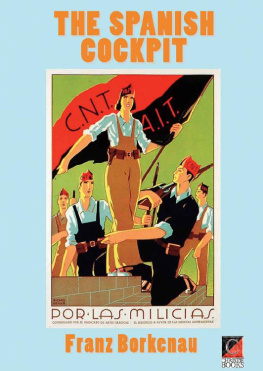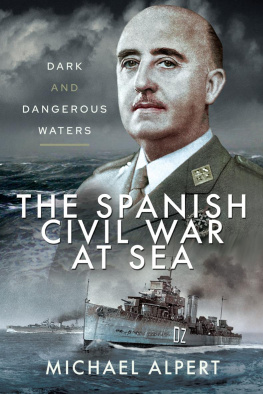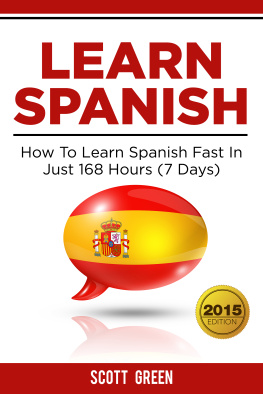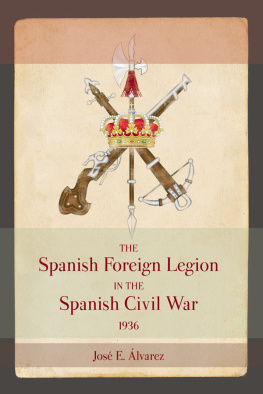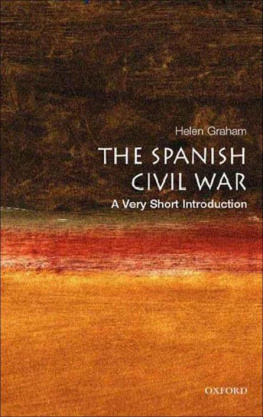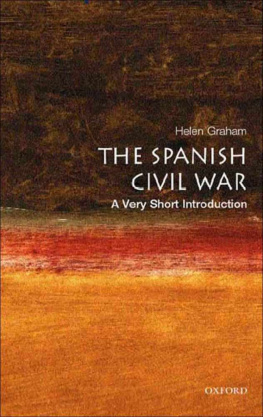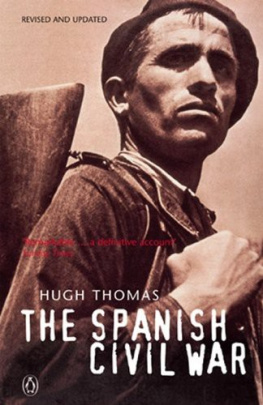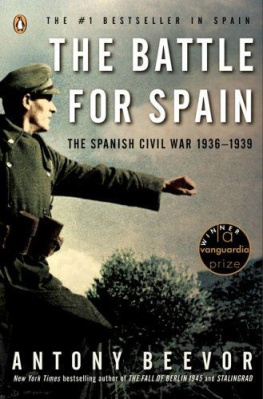Franz Borkenau - The Spanish Cockpit: An Eye-Witness Account of the Political and Social Conflicts of the Spanish Civil War
Here you can read online Franz Borkenau - The Spanish Cockpit: An Eye-Witness Account of the Political and Social Conflicts of the Spanish Civil War full text of the book (entire story) in english for free. Download pdf and epub, get meaning, cover and reviews about this ebook. year: 2016, publisher: Christie Books, genre: Politics. Description of the work, (preface) as well as reviews are available. Best literature library LitArk.com created for fans of good reading and offers a wide selection of genres:
Romance novel
Science fiction
Adventure
Detective
Science
History
Home and family
Prose
Art
Politics
Computer
Non-fiction
Religion
Business
Children
Humor
Choose a favorite category and find really read worthwhile books. Enjoy immersion in the world of imagination, feel the emotions of the characters or learn something new for yourself, make an fascinating discovery.
- Book:The Spanish Cockpit: An Eye-Witness Account of the Political and Social Conflicts of the Spanish Civil War
- Author:
- Publisher:Christie Books
- Genre:
- Year:2016
- Rating:5 / 5
- Favourites:Add to favourites
- Your mark:
- 100
- 1
- 2
- 3
- 4
- 5
The Spanish Cockpit: An Eye-Witness Account of the Political and Social Conflicts of the Spanish Civil War: summary, description and annotation
We offer to read an annotation, description, summary or preface (depends on what the author of the book "The Spanish Cockpit: An Eye-Witness Account of the Political and Social Conflicts of the Spanish Civil War" wrote himself). If you haven't found the necessary information about the book — write in the comments, we will try to find it.
Franz Borkenau: author's other books
Who wrote The Spanish Cockpit: An Eye-Witness Account of the Political and Social Conflicts of the Spanish Civil War? Find out the surname, the name of the author of the book and a list of all author's works by series.
The Spanish Cockpit: An Eye-Witness Account of the Political and Social Conflicts of the Spanish Civil War — read online for free the complete book (whole text) full work
Below is the text of the book, divided by pages. System saving the place of the last page read, allows you to conveniently read the book "The Spanish Cockpit: An Eye-Witness Account of the Political and Social Conflicts of the Spanish Civil War" online for free, without having to search again every time where you left off. Put a bookmark, and you can go to the page where you finished reading at any time.
Font size:
Interval:
Bookmark:
THE SPANISH COCKPIT
An Eye-Witness Account of the Political andSocial Conflicts of the Spanish Civil War
by
Franz Borkenau
Foreword by Gerald Brenan
First published 1937
This eBookpublished March 2016 by ChristieBooks
http://www.christiebooks.com/ChristieBooksWP/
Table of Contents
FOREWORD
PREFACE
I THE HISTORICAL BACKGROUND
The Old Monarchy
The Restoration Period
The Primo Dictatorship
The Second Republic
II A DIARY IN REVOLUTION
1936
5 August, 6 p.m., in the train from Port Bou So Barcelona
11 p.m. Barcelona
6 August.
7 August.
8 August.
9 August.
10 August.
Catalonia and the Aragon Front
12 August.
13 August.
14 August.
15 August.
16 August.
17 August.
18, 19, and 20 August.
21 August.
Two days in Valencia
22 August.
24 August. In the train from Valencia to Madrid.
25 August. Madrid
26 August.
27 August.
28 August.
29 and 30 August.
The Western and Southern Front
31 August.
1 September.
2 September.
3 September.
4 September.
5 September.
6 September.
7 September.
Madrid
12 September.
13, 14 September.
15 September.
III THE SECOND JOURNEY
Barcelona Again
Valencia: The Central Government
Malaga
Fight in the Air
Crisis
In Jail. The Police Rgime
Leaving Spain
IV THE BATTLE OF GUADALAJARA
V CONCLUSIONS
GLOSSARY
Names of Spanish Institutions
Los paisanos armados eran ciertamente muchos; pero habia muypocos fusiles, y de estos la mitad resultaban intiles por falta de cartuchos;y con qu se hacan los cartuchos si no haba plvora? A esto habamos llegadocuatro meses despus de la victoria de Bailn. Todo al revs. Ayer barriendo alos Franceses, y hoy dejndonos barrer; ayer poderosos y temibles, y hoyimpotentes y desbandados. Contrastes y anttesis prpios de la tierra, como elpao pardo, los garbanzos, el buen vino y el buen humr. Oh, Espaa, cmo sete reconocer en cualquier parte de tu historia adonde se fije la vista! Y nohay disimulo que te encubra, ni mascara que te oculte, ni afeite que tedisfigure, porque adondequiera que aparezcas, all se te reconoce desde cienleguas, con tu media cara de fiesta y la otra media de miseria, con la una manoempuando laureles y con la otra rascndote tu lepra.
Certainly,many of the burghers had arms; but there were very few rifles, and of thosehalf were useless because cartridges were lacking; and how to producecartridges without powder? To such straits had we got four months after thevictory of Bailn. Now it was just the reverse. Yesterday we closed in upon theFrench; now they were closing in upon us; yesterday we were powerful and awe-inspiring;now we were impotent and in disintegration. Contrasts and antitheses belongingto the soil as white bread, beans, good wine, and good humour. O Spain, howthou art the same into whatsoever part of thy history one may look! And thereis no dissimulation to cover thee, no mask to hide thy face, no ointment toadoro thee, because, wherever thou appearest, thou art recognized from ahundred miles away; one half of thy face in the mood of a fiesta, and the otherwith misery grinning through it; one hand bearing laurels, and the otherscratching thy leprous sores.)
GALDS,Episdios Nacionales.
Gerald Brenan
When The Spanish Cockpit came out exactly ayear after the outbreak of the Civil War it made an immediate impression oneveryone who had not been blinded by the propaganda of one side or the other.The account it gave of the political situation was something that few peoplehad been prepared for. We learned that the Communists were not playing theirhistoric role of leading the proletariat, but on the contrary were allyingthemselves with the shopkeepers and rich farmers and doing their utmost to dampdown the revolutionary impulses of the peasants and factory workers. We weretold that the chief reason for this was that the real revolutionary forces inSpain were the Anarcho-Syndicalists and for the first time got an intelligibleaccount of this huge, loose organization which seemed mysterious andincomprehensible because it had no counterpart in any other country. The authorscomments on what he saw were brilliantly acute and penetrating and his desireto get to the truth so evident that no one could doubt that he had given atrustworthy account of the evolving situation.
Behind every important book there is a long history of study and preparationand Franz Borkenaus was no exception to this. His father had held a positionas judge and professor in the Austrian Empire, and Franz was brought up as aCatholic, although he was of Jewish descent. He joined the German CommunistParty, and here his intelligence got him a post in the Comintern, where heworked for several years till he became disillusioned both with communism andwith Marxism, characteristically giving as his chief objection to them theirlack of realism and their pedantry. He then decided to become a sociologist andafter a course of study went out to Panama where he remained, I think, for sixmonths. He had only just returned to Europe when the Spanish Civil War brokeout and he saw his opportunity.
The Spanish Cockpit is a classic of its kind because Borkenau is the only person tohave written on the Civil War who had both a mind of the first order and athorough political education. He knew what questions to ask, he visited thefront and the back regions, and he was an excellent observer. No book on thiswar is more perspicacious or more truthful. Yet Borkenau, whom I got to knowand like, was not, as he thought himself, a democratic liberal, but a sort ofNietzschean romantic, who only arrived at the truth after a struggle withhimself. This unfitted him for understanding the English characterheregarded it as weak and colorlessbut helped him to understand and deeplyadmire the Spanish. For this reason TheSpanish Cockpit is not only a model of what the study of a revolutionshould be, but one of the best books ever published on Spain. Franz Borkenaudied in 1957.
This book iswritten with a double end in view. In the first place, it wants to give an ideaof the political developments in the camp of the Republican Government inSpain. Of these developments, both among the masses and among the rulingstrata, relatively little has been said in the already voluminous literatureabout the Spanish civil war, and not much more in the daily Press. Attentionhas been directed almost exclusively to the military operations. Yet theSpanish civil war is not a war in the ordinary sense of the word. Both armiesare extremely weak numerically; their technical outfit is limited and theircommand lacks military experience. The decision of victory will largely dependon political developments behind the lines, and on the international situation.The international situation will not be dealt with in this book. But thehistory of the Spanish Left, in its various shades, its specificcharacteristics, its antagonisms, achievements, and failures, is its mainsubject matter.
If the present international situation is outside its scope, thatis not to say that in this study Spanish affairs are viewed from a purelypeninsular standpoint. Its second aim is to describe the specificcharacteristics of the Spanish conflict, as contrasted with conflicts in othercountries. All Spanish parties, even those like the Anarchists which havehardly a counterpart abroad, claim to be Spanish specimens of internationalmovements. In most cases the claim, in my opinion, is entirely unjustified, andin those instances (such as the Communists and Trotskyists) where it isjustified, it means that the movement has failed to take deep roots in theSpanish soil. I began my studies under the common delusion that the Spanishrevolution was simply an incident in the fight between Left and Right,Socialism and Fascism in the European sense of the word; I have been convincedby observation on the spot that this is not so, and have since tried todiscover, under the external appearances which present the common form ofpolitical struggle throughout Europe, these actual driving forces which reallydiffer widely from the conventional European patterns that are being generallyused to describe them.
Font size:
Interval:
Bookmark:
Similar books «The Spanish Cockpit: An Eye-Witness Account of the Political and Social Conflicts of the Spanish Civil War»
Look at similar books to The Spanish Cockpit: An Eye-Witness Account of the Political and Social Conflicts of the Spanish Civil War. We have selected literature similar in name and meaning in the hope of providing readers with more options to find new, interesting, not yet read works.
Discussion, reviews of the book The Spanish Cockpit: An Eye-Witness Account of the Political and Social Conflicts of the Spanish Civil War and just readers' own opinions. Leave your comments, write what you think about the work, its meaning or the main characters. Specify what exactly you liked and what you didn't like, and why you think so.

